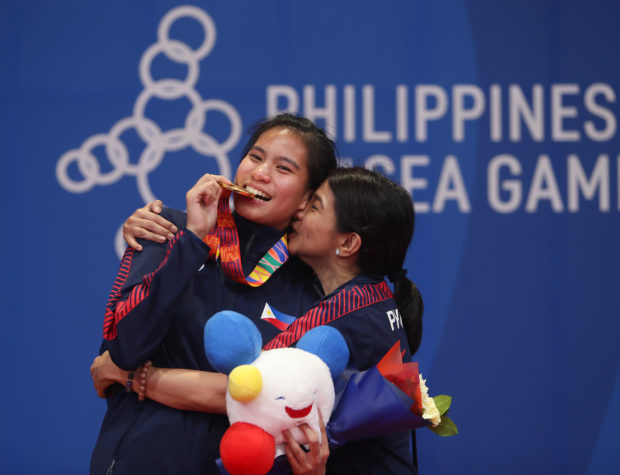A hidden opponent
Their training hamstrung by quarantine limitations in the time of a global pandemic, athletes are faced with another challenge from the inner recesses of their minds.
“They’re just human, too,” said renowned sports psychology consultant Marcus Manalo, who works with several national athletes and collegiate and professional sports programs.
Athletes, however, are hyper human. And not only are their skills amplified by the rigors of daily training, but their emotions, too. And as the COVID-19 pandemic keeps their physical routine confined to homes, there is a need to visit a different confinement—one that grows from within.
For a lot of athletes, the virus that has shut down parts of the world hasn’t only stunted their physical development. It has also come at a time when they were high on expectations fueled by what was supposed to happen.
“Before the pandemic, I was looking forward to competing in the Olympic qualifiers the most,” said Jamie Lim, a gold medalist in women’s karate in the recent Southeast Asian Games. Lim was on an emotional high with how her career was turning out. “I thought the stars [aligned]—at least [in terms of] scheduling. I just graduated in 2019, then there was the SEA Games the same year.”
She wasn’t the only one whose emotions were primed for big leaps in 2020.
“We had so many things lined up—basketball [games], [promotional] shoots. Then all this happened,” Jack Animam said in Filipino. Animam spearheaded a historic golden run by the Gilas Pilipinas women in the SEA Games and was supposed to play as an import abroad.
What these athletes go through could be a blueprint that the country could look at in addressing the mental effects of a pandemic.
New normal
Health experts have raised flags on addressing people’s mental fitness, too, in a time of prolonged isolation.
“This is going to bring a lot of negative emotions, such as stress, anxiety, disappointment,” Manalo said.
These feelings will accompany whatever problems people face. For most of the country, it’s about getting to the next meal or the next paycheck. For athletes, it’s whipping up their bodies to competitive shape and ticking off boxes in their to-do lists.
“Training facilities are closed, daily routines have been [altered],” he added. “So it’s really challenging for athletes and for their coaches to continue supporting their [wards].”
Manalo said feelings of mental and emotional discomfort could swell for people during the time of quarantine. And it is heightened in athletes, whose self-esteem, relationships and even livelihood often revolve around competition and sport.
“The stress can be overwhelming. While we expect them to be tough, endure pressure and challenges, it can also be overwhelming for them,” he said.
“There are some who are disheartened right now,” said Jay Futalan, strength and conditioning coach of famed Olympian weightlifter Hidilyn Diaz.

Jamie Lim says she was looking forward to the Olympic qualifiers before the COVID-19 pandemic shut down sports events all over the world. —EDWIN BACASMAS
Coping mechanisms
“Among the fundamental things in sports psychology is to control what you can control,” said Manalo, a cochair of a Psychological Association of the Philippines’ (PAP) special interest group.
Manalo recommends making to-do lists, trying out new exercises, engaging in house chores, turning to meditation, and even maintaining a journal as ways to mitigate the fading sense of fulfillment.
“In great times of uncertainty, new routines go a long way because it could help you establish control and comfort,” he said, adding these tasks mimic the dynamics of a game.
Lim said karate coach Okay Arpa has given the national team a routine that could be done at home. But the SEA Games gold winner, however, pointed out that she is among the lucky ones to have ample equipment around her to help in her training.
Animam, though in constant communication with National U and Gilas trainers, understands that there will be limitations. “It’s a bit harder because there’s not a ring around I can shoot hoops with.”
Meggie Ochoa, the country’s top jiujitsu athlete, revealed that she is dealing with the lack of training partners by focusing her energies on her advocacy against child exploitation, Fight to Protect.
Sporting titans LeBron James and Serena Williams have been open on social media about coping mechanisms, and both have been open with their struggles as well.
“I don’t think I’ll be able to have any closure if we do not have an opportunity to finish this season,” said James, one of the biggest names in the NBA, whose current season has been suspended indefinitely.
“That one cancellation (Indian Wells) led to another and another and then led to all this anxiety that I’m feeling,” Williams, tennis’ megastar, said in a TikTok video.
The inner turmoil can strike without notice. And Manalo said coaches have to be aware of the situation.
“It is really important to really maintain communication with the athletes, to really check on them,” he said.
“As coaches, we have to [preach] the mind-set that this is just a temporary obstacle we’re facing. So we have to be creative,” Futalan said in a Zoom interview streamed by the Sport Management Council of the Philippines on April 4.
And that’s not even dealing with other insidious threats. Sexual and domestic abuse could emerge from under the blanket of isolation and Manalo believes athletes are just as vulnerable.
“Some of these people will be forced to stay in potentially harmful situations—not-so-ideal ones in terms of environments,” Manalo said.
Tell-tale signs
Depression, nervous breakdowns and anxiety disorder are among the many mental health conditions athletes and the rest of the general population could develop during confinement, according to Manalo.
And there are signs to watch out for: Difficulty in finishing tasks that are typically completed with ease, sleeping problems, low energy levels, erratic focus, and even thoughts of self-harm.
Acknowledging those signs of unease is the first step.
“They’re there. They’re inevitable,” Manalo said. “But [people] still have the power to choose [their] response. There will be negative thoughts and emotions, but the key here is not letting them linger.”
Once the problem is acknowledged, it is easier to seek help.
“It’s important for people to be able to talk about the ordeal because we don’t want them to get get to a point that they’re already overwhelmed,” Manalo said.
On April 1, the PAP released a list of centers offering free online psychological services.
Manalo encourages athletes to also look at the current situation through an optimistic lens.
“As much as you want to win a medal in a competition, that’s still a bit far-fetched,” Manalo said. “Now is about celebrating small wins. It’s the only way athletes could keep their sense of sense of fulfillment.”
For more news about the novel coronavirus click here.
What you need to know about Coronavirus.
For more information on COVID-19, call the DOH Hotline: (02) 86517800 local 1149/1150.
The Inquirer Foundation supports our healthcare frontliners and is still accepting cash donations to be deposited at Banco de Oro (BDO) current account #007960018860 or donate through PayMaya using this link.
